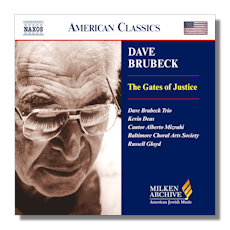
The Internet's Premier Classical Music Source
Related Links
- Latest Reviews
- More Reviews
-
By Composer
-
Collections
DVD & Blu-ray
Books
Concert Reviews
Articles/Interviews
Software
Audio
Search Amazon
Recommended Links
Site News
 CD Review
CD Review
Dave Brubeck

The Gates of Justice
Dave Brubeck Trio
Kevin Deas, bass-baritone
Alberto Mizrahi, cantor
Baltimore Choral Arts Society/Russell Gloyd
Naxos 8.559414 DDD 50:13
Recently, on the occasion of Telarc's release of Classical Brubeck, I had the pleasure of interviewing Dave Brubeck for Fanfare magazine. I knew the man for his piano jazz, of course, and for classic numbers such as "Take Five" and "Blue Rondo à la Turk" from the Time Out album. I was unaware, however, of his "classical" side, of which The Gates of Justice is yet another example. Written in 1969, Gates was his second large oratorio (not a term used by Brubeck, apparently), following 1967's The Light in the Wilderness.
Gates was, among other things, an attempt to mediate between American Jews and African-Americans, upon the belief that the two groups had more in common than not, despite the tensions that were bubbling up in the late 1960s. (Brubeck wrote, "The essential message of The Gates of Justice is the brotherhood of man.") As a jazz musician, Brubeck had half a headstart, because jazz, at its birth, was the music of African-Americans. It was the Union of American Hebrew Congregations that commissioned Gates, however, along with the University of Cincinnati's College Conservatory of Music. For his texts, Brubeck chose a typically eclectic mix of excerpts from biblical and Hebrew liturgical texts, the recently assassinated Martin Luther King, Negro spirituals, and the Jewish sage Hillel. Brubeck's wife Iola also contributed to the libretto.
The music is no less eclectic. Brubeck is an intuitive and sophisticated jazz musician. As a classical musician, he can be touchingly naïve in the way that he allows different styles of music bump up against each other with hardly any preparation. The blues rubs shoulders with a lot of Orff-like choral writing, which in turn gets cozy with Brubeck's interpretation of Jewish liturgical music. Like Leonard Bernstein's Mass, The Gates of Justice is a product of its times, not just philosophically, but musically too. This is a nice way of saying it is dated, I suppose, but so what? A little nostalgia can be a wonderful thing, and who can disagree with the sentiment "Make peace, not war"? (Changing "peace" to "love" would have created the perfect 60s experience!)
This recording dates from what must have been a lot of hard work on March 25, 2001. To record a 50-minute work in a single day is no small feat, and the performance definitely has a rolled-up-sleeve quality to it – not polished, but committed. Because Brubeck was present and performing, I assume that what is presented here more or less reflects his intentions. Still, there are some misfires, including Mizrahi's strained singing, and some awkward line readings from Deas, who can sound petulant when it would make more sense for him to sound humble. Brubeck, bassist Michael Moore, and drummer Randy Jones sound very much in their element. The singers of the Baltimore Choral Arts Society are enthusiastic, which probably counts for 75% in this work. Gloyd, frequently the conductor during Brubeck's classical outings, keeps Gates moving along seamlessly.
This CD is part of Naxos' "American Classics" series and was supported by the Milken Archive of American Jewish Music.
Copyright © 2004, Raymond Tuttle


















